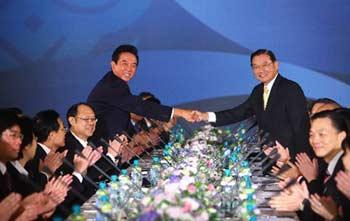China
Taiwan´s foundation head foresees steady advance for cross-strait talks
Source: Xinhua | 11-20-2008 08:04
Special Report: ARATS Chief visits TaiwanTAIPEI, Nov. 19 (Xinhua) -- Chiang Pin-kun, chairman of the Taiwan-based Strait Exchange Foundation (SEF), predicts a steady advance for the cross-strait talks, after the historic visit to Taiwan by Chen Yunlin, director of the Mainland-based Association for the Relations across the Taiwan Strait (ARATS).
 |
|
Chinese mainland's Association for Relations Across the |
Chen's visit, between Nov. 3 and 7, is a breakthrough for the regularized talks between the two organizations, said Chiang, in an interview with Xinhua correspondents, on Tuesday.
The SEF and the ARATS signed four agreements during Chen's Taiwan tour, following the signing of two other agreements between the two sides last June, when Chiang met Chen in Beijing.
All these indicate that cross-strait relations are improving rapidly with all-around impacts that will help improve cross-strait ties, benefit the welfare of the people living on the two sides, said Chiang. A recent survey shows that Taiwan people are in favor of the new talks, he added.
These agreements, including those on the opening of direct flights and navigation across the straits, will be beneficial to increasing Taiwan's economic strength and competitiveness, said the SEF chairman.
He suggested that international companies used Taiwan as a springboard for them to manage their businesses on the mainland or the whole of Asia, so that it could be "quite easy for Taiwan to fulfill its dream of becoming the Asia-Pacific center for business operation."
These exchanges will further shorten the distance between the two sides, geographically and psychologically, and it is helpful for the peaceful development across the strait, Chiang said. Moreover, he said, the opening of more direct chartered flights and airports, on the two sides, will be absolutely helpful to the gloomy economy of Taiwan.
During Chen's visit, transport operators and bankers from the two sides exchanged their views on their possible cooperation in the future, which will be beneficial for the two sides to cope with the current global financial crisis, the SEF chairman said.
According to Chiang, 70 percent of Taiwan people support these agreements, though there are differences between the ruling Kuomintang Party and the former ruling party, Taiwan's Democratic Progressive Party (DPP).
"Director Chen Yunlin is welcome to visit Taiwan once again," Chiang said, noting that he expected a third round of talks with the ARATS head on issues that are mutually-beneficial.
Chiang praised Chen for his calmness when there were protests held by some people from Taiwan's "green camp", mainly referring to supporters of the DPP. He noted that Chen had served as head of the mainland's State Council Taiwan Affairs Office for 15 years and has a good knowledge of Taiwan.
The majority of Taiwan people are warm-hearted, simple and honest, and hospitable to visitors, while mainland tourists will be well protected when they travel to Taiwan, said Chiang.
In the future, he said, the two bodies will focus their talks on issues like the protection of investment, the prevention of double taxation, the protection of intellectual rights, and cooperation on crackdowns on crimes, rather than issues that are related to politics. The two sides, particularly Taiwan people and Taiwan business people on the mainland, will benefit from the resolving of these problems, he stressed.
Editor:Zhang Ning



